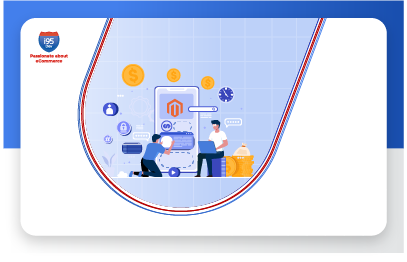Magento is the most preferred e-commerce platform, trusted by more than 250K merchants worldwide, for a reason. It gives merchants the complete flexibility to customize the e-commerce platform to their requirements. The same flexibility is also responsible for the availability of a plethora of extensions, for everything imaginable, in the marketplace.
Consider Payments, one of the most important aspects of e-commerce. It will not be an understatement to say that the advances in online payment processing and e-payment technology is one of the primary drivers for growth in e-commerce. Hence, Magento, by default and through extensions, supports more than 90 payment gateways with more being added to the list.
With so many options available, how can a business decide which payment gateways to support? A decision that should be taken with caution. In this blog, we will start by understanding the advantages of accepting payments online. We will then have a quick look at the key terms used in reference to payment processing, the key questions that a business must ask before selecting a payment gateway, and finally, we will wrap this blog with the top payment gateways for Magento.
The Advantages of Accepting Payment Online
- Faster Payments – You no longer have to wait for the checks to arrive and to clear. With online payments, the transactions are completed in seconds and the amount can be captured immediately. This can remove a lot of uncertainty from your business while improving the flow of capital.
- Improved Conversions and Customer Satisfaction – Customers live in the world of instant gratification. They want everything to happen instantly. Traditional payment methods can put them off and drive them to competition.
- Improve Operational Efficiency – Accepting online payments saves you from the trouble of depositing checks or recording of payments manually. The accounts are easy to create and all online payments happen digitally. Some payment gateways also absolve you of the task to save customers’ payment (debit/ credit card) information enabling easier and faster payments in future.
- Profit vs. Cost – Obviously, anything of value comes with a cost. The same is true with payment gateways as well – the payment gateways will charge you a fee, including fees per transaction. And often, the benefits will outweigh the costs. Online payment gateways enable you to expand your business by making it possible to accept payments online.
The Payment Processing Ecosystem
The payment processing ecosystem can be difficult to understand, thanks to the varied terminology and actors used to explain. Understanding them is very crucial for selecting the right payment gateways for your e-commerce store.
- Payment Gateway – A payment gateway is a service provided by banks/ payment service providers, that enables businesses to accept payments (via credit card). This is facilitated by establishing a secure bridge between the merchant and the payment processor to transfer key information between the portal (e-commerce here) and the payment processor. A payment gateway performs the same functions as a credit card swipe machine at a restaurant or retail store.
- Payment Processor – A payment processor is a company (usually the merchant’s bank) appointed by the merchant to handle requests (read transactions) from the payment gateway. The payment processor is responsible for validating the debit/ credit card details, check for availability of funds to cover the transaction cost, carry out a series of anti-fraud measures, and settlement. The payment processor is also responsible for communicating status updates back to the payment gateway.
- Payment Service Provider – The Company that operates the payment gateway.
- Merchant Account – A special bank account held by the merchant that allows direct receipt of debit/ credit card payments.
- Card Association – Card associations are companies like Visa, MasterCard, American Express, etc. that partner with banks to issue debit/ credit cards to customers.
- Acquiring Bank – The merchant’s bank who will receive the payment on behalf of the merchant.
- Issuing Bank – The bank who had issued the debit/ credit card to the customer and will be responsible for making the payment on behalf of the customer.
- PCI DSS Guidelines – A set of guidelines recommended to protect critical customer data (like credit card information) and to mitigate the risk of online financial fraud.
- PCI Compliance – PCI Compliance is a certificate issued to the merchant for complying with PCI DSS guidelines.
Questions to Ask before Selecting a Payment Gateway (in addition to the basic questions)
In addition to evaluating the basic parameters like set up fees, recurring fees, transaction fees, etc. also consider asking the following questions around scalability, accessibility, ease of integration, usability, etc. before selecting a payment gateway.
- How will the payment gateway help you to enhance the user’s checkout experience?
Selecting a right payment gateway goes a long way in enhancing your customer checkout experience. Payment gateways like Braintree, Paypal Express, and Amazon Pay have the option to auto-populate the customer’s information making payments a lot easier.
Consider this, according to a study by Invesp a 5% increase in customer retention can increase the profit margins by 25% – 95%. Hence, choosing the right payment gateway is very important for an e-commerce business.
- How easy is it to integrate the payment gateway with your e-commerce platform?
Check if your e-commerce platform has an extension available to integrate with the payment gateway. While most payment gateways offer APIs to support integration, an existing extension can improve the turnaround time.
- How scalable is the payment gateway?
Select a payment gateway that can scale with your business. For example, consider Stripe. Stripe is little different from the traditional payment gateways and offers multiple packages for different size of businesses. Stripe also allows merchants to accept payments from customers directly from third party apps/ platforms like Twitter.
- How accessible is the Payment Gateway?
Does the payment gateway support multiple countries? Your customers probably reach out to your from multiple locations and not all payment gateways support all locations. For example, one of the primary reason for the growing popularity of Braintree is that it accepts payments in more than 130 currencies. Merchants from around 40 countries use Braintree as a preferred payment gateway for their e-commerce store.
Top 5 Payment Gateways Available for Magento
Here is a list of the top payment gateways available for Magento. These payment gateways are used by merchants all over the world and are known for their features and service.
PayPal
Undoubtedly the most preferred payment gateway for Magento e-commerce platforms. They are termed to be the pioneers who spearheaded the online payments movement back in the 90’s. Many Magento merchants even use PayPal as their sole e-commerce payment gateway.
Reasons to consider PayPal:
- Fraud protection in PayPal involves advanced encryption and 24 hours monitoring
- PayPal customers have the option to spread their credit card payments over time
- More than 165 million users have a PayPal account
- Preferred payment method for customers who do not wish to share their credit card information
- Refund on returns option is available with PayPal
Fee details:
- Transaction Fee – 2.9% + $0.30 (can be negotiated based on volume) for domestic transactions, 3.9% + fixed fee for international transactions
Authorize.Net
Authorize.Net is one of the most popular payment gateways among merchants on Magento e-commerce platform. Available for businesses based out of United States, Europe, Canada and Australia, this solution caters mostly to small and mid-size businesses.
Reasons to consider Authorize.net:
- Basic security measures like CVV verification
- Advanced fraud detection suite
- Also supports payments via e-checks, Apple Pay, PayPal and Visa checkout
- CIM (Customer information Manager) functionality that allows merchants to store customer information like credit card details for future use.
- On-site checkout process
Fee details:
- Setup Fee – $49
- Recurring Monthly Charge – $25
- Chargeback Fee – $25
- Transaction Fee – 2.9% + $0.30
BrainTree
Another robust and popular payment gateway among Magento merchants. BrainTree’s What drives BrainTree’s popularity is its scalability and even works well for small businesses.
Reasons to consider BrainTree:
- Seamless one-click checkout experience
- Used by merchants in more than 40 countries
- Accepts payments in more than 130 currencies
- Basic fraud protection like CVV verification and Risk Threshold.
- Advanced fraud protection like 3D secure, Kount Standard and Kount Custom
- Also supports payments via Apple pay, Venmo, Bitcoin, PayPal and Android Pay
- Braintree’s Drop In Payment service makes it easy to add payment options to a website or mobile app, including seamless integration with PayPal
Fee details:
- No Setup Fee
- Transaction Fee – 2.9% + $0.30
Stripe
This solution makes the list simply for being the most offbeat payment gateway available – designed for developers and not merchants.
Reasons to consider Stripe:
- Stripe allows merchant to accept payments through AliPay
- Stripe even allows customers to buy products from Twitter, Shopstyle, and other third party apps
- Stripe gives merchants the ability to offer coupons
- The solution supports multiple billing schedules like monthly, weekly, and yearly
Fee details:
- Chargeback Fee – $15
- Transaction Fee – 2.9% + $0.30
Amazon Payments
Amazon Payments was launched in the year 2007 with the goal to provide the same checkout experience as Amazon.
Reasons to consider Amazon Payments:
- Supports one-click checkout
- The transactions can be conducted without the customer leaving the website
- With increased vetting of credit cards, Amazon Payments provides a more secure environment for international payments
- A huge international team of data scientists and a strong technical team boosts the trust of customers to protect against fraudulent practices.
Fee Details:
- Net Setup Fee
- Chargeback Fee – $20
- Transaction Fee – 2.9% + $0.30
- No Fraud Protection Fee
Apart from these, there are numerous other payment gateways to choose from like 2Checkout, PayFabric, MoneyBooker, WorldPay etc. While the discretion of choosing the payment gateway completely lies with the merchant, we advise merchants to consider points discussed in this article.
We have worked with a number of clients and helped them in selecting the right payment gateway. For payment gateways that did not have an extension available for Magento, we have successfully integrated them with our customer’s Magento e-commerce store. In the next blog, we will look at two such payment gateways.
Bottom line, you pick a payment gateway for your Magento store, and we will do the rest.






